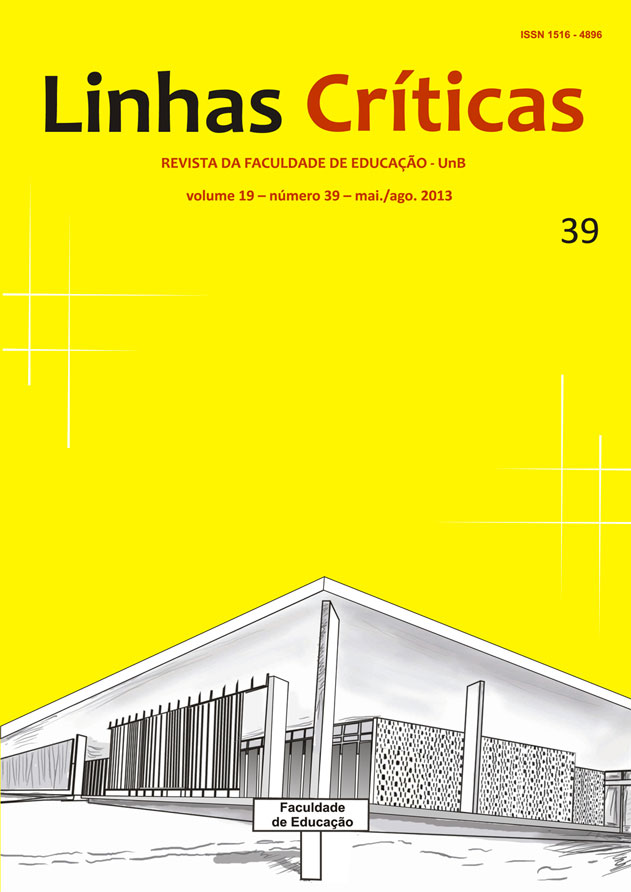464Sensitizing the inner human nature: man-nature unity and environmental education
DOI:
https://doi.org/10.26512/lc.v19i39.4161Keywords:
Nature, Philosophy, Sensibility, Environmental educationAbstract
This paper seeks to contribute with a philosophical approach to a more consitent foundation of Environmental Education, in order to make possible the improvement of public health in communities through disease-prevention practices. Firstly, the text shows the relationship between public health and environmental education; next, it brings a philosophical and historical comprehension of the man-nature relationship, claiming that nature is an intrinsic aspect of the human condition. Lastly, it supports the idea that the emergence of attitudes of human sensitization towards nature is not antagonistic with an ontology that has always been present in human history and that approximates man and physis. The thesis supported in the paper is that the acceptance of human sensibility can bring together three fields of knowledge (public health, environmental education and philosophy) and might be a bridge to restore elements which have been lost, repressed or forgotten with the man-nature split that took place more expressively with modern science, which clearly dichotomized the subject and the object of knowledge.
Downloads
References
ABBAGNANO, Nicola. Dicionário de Filosofia. São Paulo: Ed. Mestre Jou, 1962.
ABRANTES, Paulo. Imagens de natureza, imagens de ciência. Campinas: Papirus, 1998.
BACHELARD, Gaston. A formação do espírito científico. Rio de Janeiro: Contraponto, 1996.
COLLINGWOOD, Robin George. Ciência e Filosofia. Lisboa: Editorial Presença, s/d.
COLLINGWOOD, Robin George. A idéia de natureza. Lisboa: Editorial Presença, s/d.
FLICKINGER, Hans-Georg. Sociedade, educação e meio ambiente. In: MARCON, Telmo. (Org.). Educação e universidade ”“ práxis e emancipação. Passo Fundo: Editora da UPF, 1998. p. 365-384.
JAEGER, Werner. La teología de los primeros filósofos griegos. México: Fondo de Cultura Económica, 1952.
KANT, Immanuel. Crítica da Razão Pura. 5. ed. Lisboa: Fundação Calouste Gulbenkian, 2001.
KESSELRING, Thomas. O conceito de natureza na história do pensamento ocidental. Episteme, Porto Alegre, n.11, p. 153-173, jul./dez. 2000.
KUHN, Thomas. A estrutura das revoluções científicas. 9. ed. São Paulo: Perspectiva, 2006.
KUHN, Thomas. The Structure of Scientific Revolutions. Second Edition, Enlarged. Chicago: The University of Chicago Press, 1970.
LARA, Tiago Adão. Caminhos da razão no Ocidente: a filosofia nas suas origens gregas. Petrópolis, RJ: Vozes, 1989. 4. ed. Coleção Caminhos da Razão. V. 1.
LAYRARGUES, Philippe Pomier. A natureza da ideologia e a ideologia da natureza: elementos para uma sociologia da educação ambiental. Campinas: Unicamp, 2003. (Tese de Doutorado em Ciências Sociais).
LEFRANC, Jean. Compreender Schopenhauer. Petrópolis, RJ: Vozes, 2002.
LENOBLE, Robert. História da idéia de natureza. Lisboa: Edições 70, 2002.
LOUREIRO, Carlos Frederico Bernardo. Educação ambiental transformadora. In: LAYRARGUES, Philippe Pomier. (Org.). Identidades da educação ambiental brasileira. Brasília: Ministério do Meio Ambiente, 2004. p. 65-84.
MARCUSE, Herbert. Eros e civilização: uma interpretação filosófica do pensamento de Freud. 8 ed. Rio de Janeiro: LTC Editora, 1999.
MARX, Karl; ENGELS, Friedrich. A ideologia alemã: crítica da mais recente filosofia alemã em seus representantes Feuerbach, Bruno Bauer e Stirner, e do socialismo alemão em seus diferentes profetas. São Paulo: Boitempo, 2007.
MINISTÉRIO DA SAÚDE. Conselho Nacional de Saúde. Subsídios para construção da política nacional de saúde ambiental. Série B. Textos Básicos de Saúde. Brasília, 2007.
MORIN, Edgar. O método II ”“ a vida da vida. 2. ed. Portugal: Publicações Europa-América, 1980.
NUNES, Ellen Regina Mayhé. Educação Ambiental: princípios e objetivos. Revista de Educação AEC, Brasília, DF, ano 17, n. 68, p. 19-28, abr./jun. 1988.
PEDRINI, Alexandre de Gusmão. Trajetórias em Educação Ambiental. In: PEDRINI, Alexandre de Gusmão (Org.) Educação Ambiental: reflexões e práticas contemporâneas. 5.ed. Petrópolis: Vozes, 2002.
PICHT, Georg. Der Begriff der Natur und seine Geschichte. Stuttgart: Klett-Cotta, 1989.
RICOEUR, Paul. Historia y Narratividad. Barcelona: Paidós, 1999.Rousseau, Jean-Jacques. Do Contrato Social (1757); Ensaio sobre a origem das línguas (1759); Discurso sobre a origem e os fundamentos da desigualdade entre os homens (1755); Discurso sobre as ciências e as artes (1749). Trad. Lourdes Santos Machado; introduções e notas de Paul Arbousse-Bastide e Lourival Gomes Machado. 3. ed. São Paulo: Abril Cultural, 1983. (Coleção Os Pensadores)
SAVIANI, Dermeval. Educação: do Senso Comum à Consciência Filosófica. 13. ed. Campinas: Autores Associados, 2000.
SCHELLING, Friedrich Wilhelm Joseph von. Filosofia da arte. São Paulo: Edusp, 2001.
SCHELLING, Friedrich Wilhelm Joseph von. Sistema del idealismo transcendental. Barcelona: Anthropos, 1988.
SCHÜTZ, Rosalvo. Sensibilidade emancipatória: Schelling, Feuerbach e Marx à contrapelo da tradição. In: CHAGAS, Eduardo; REDYSON, Deyve; DE PAULA, Márcio (Orgs.). Homem e natureza em Ludwig Feuerbach. Fortaleza: Edições UFC, 2009. p. 171-212.
SILVA, Arlindo et all. Reestruturação da cooperação técnica em saúde ambiental entre FUNASA, estados e municípios. Brasília: 2003. Disponível em <http://www.semasa.sp.gov.br/Documentos/ASSEMAE/Trab_01.pdf>. Acesso em 22/12/2009.
TOURAINE, Alain. Crítica da Modernidade. Petrópolis, RJ: Vozes, 1994.
Downloads
Published
How to Cite
Issue
Section
License
Copyright (c) 2016 Linhas Críticas

This work is licensed under a Creative Commons Attribution 4.0 International License.
Authors who publish in this journal agree to the following terms:
-Authors maintains the copyright and grants the journal the right of first publication, the work being simultaneously licensed under the Creative Commons Attribution License which allows the sharing of the work with recognition of the authorship of the work and initial publication in this journal.
- Authors are authorized to enter into additional contracts separately, for non-exclusive distribution of the version of the work published in this journal (eg publish in institutional repository or as a book chapter), with acknowledgment of authorship and initial publication in this journal.
-Authorers are allowed and encouraged to publish and distribute their work online (eg in institutional repositories or on their personal page) at any point before or during the editorial process, as this can generate productive changes as well as increase the impact and the citation of published work (See The Effect of Free Access).



